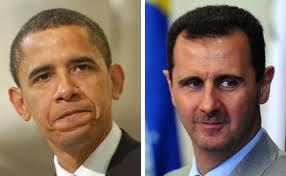Syria has become dangerous. Syrians get killed and wounded almost daily. Their neighbors have also felt the impacts of violence: refugees in Turkey and outbreaks of fighting in Lebanon’s streets — where peace depends on a nuanced arrangement between Christians and Sunni and Shia Muslims.
 Northern Iraqi Kurds share with Syrian Kurds the “statehood” ideal that has periodically shaken the region and provoked Turkey to use heavy military force.
Northern Iraqi Kurds share with Syrian Kurds the “statehood” ideal that has periodically shaken the region and provoked Turkey to use heavy military force.
Jordan and Israel watch uneasily as scores of armed rebel units do urban guerrilla warfare. Patrick Seale reports, “jihadis, armed Islamic extremists, have crossed into Syria from neighboring countries — and also from Kuwait, Tunisia, Algeria and Pakistan. … Rebel groups conduct ambushes, attack check-points, destroy public property, kill government troops — about 250 were killed in ten days in late May and early June. They also kidnap, rape and slaughter pro-regime civilians,” and easily sell the “Assad did it” line to U.S. media.
To stop the rebels from holding territory, Seale continues, Asad’s forces have shelled neighborhoods “when rebels hole up in them.” The rebels hope to provoke “Western military intervention… The rebels know they cannot defeat the Syrian army without outside help.”
Indeed, Syrian violence has begun to loom like a political cholera in the region, which anti-Assad promoters will not easily contain.
The United States continues to try to “knock off the rogues.” Disobedient, undemocratic regimes like Syria and Iran — unlike obedient Saudi Arabia and Yemen — beget Secretary of State Hilary Clinton’s and President Barack Obama’s threats and feel the pain of their sanctions — even though neither country has done anything to America. Indeed, over the past decade, Syria tortured “suspects” for Washington, and warned U.S. agencies of terrorist plots, which then were thwarted. President Assad has become a recipient of the “no good deed goes unpunished” law.
The White House responds to Syria’s efforts with phrases resonating with war tones. But one active member of the U.S. armed forces attempts suicide almost twice a day, not an indicator of readiness to fight yet another Middle East war.
The Syrian uprising with clandestine funding from Saudi and Qatari royalties and anti-Asad Syrian millionaires abroad, and support from Washington and its allies, aims to weaken Syria, Iran’s ally. The conflict, however, also raises a fear of yet another western venture into the Middle East — with a possible wider clash as well.
In early June, Secretary Clinton accused Russia of supplying attack helicopters to Assad, an act that “prolongs the violence.” Russia denied her charge, showing it had repaired older Syrian helicopters. (New York Times, June 14.) Russia then called on Clinton to stop Saudi and Qatari financing arms and mercenaries going into Syria.
Paying lip service to the U.N. plan forged by former Secretary General Kofi Annan, Clinton then told Russia to stay out of Syria — some distant region, you know, like Cuba is to the United States.
Russian Foreign Minister Sergei Lavrov said Russia resisted western intervention “because we know Syria is a complicated multi-confessional state, and because we know that some of those calling for military intervention want to ruin this and turn Syria into a battleground for domination in the Islamic world.” (AP Moscow, June 9, 2012)
“Butchers,” shout U.S. politicians and media at Syria’s rulers, accepting on faith reports from the Syrian opposition — including al-Qaeda members — that Assad’s forces massacred civilians at Houla and al-Qubair. But who really did these ugly acts? The media have until recently accepted opposition claims uncritically.
Syria’s 20.5 million are not governed by a nut like Qadaffi. Asad maintains strong support in Damascus and Aleppo, Syria’s largest cities, as well as in Alawite areas. A February poll conducted by a Qatari agency, backed by anti-Assad money, concluded Assad’s regime enjoyed 55 percent popular support — not for its virtues, but because people worried a subsequent government would be worse.
Amidst U.S. and European recessions, why provoke tensions in Syria where western intervention could provoke a new Cold War? China and Russia, fearing a big-power conflict, have refused to abide the West’s anti-Assad moves. Syria’s conflict could also ignite a regional and religious war: Saudi Arabia and Qatar versus Iran; Sunnis versus Shias.
What should the West do to stop ongoing violence to civilians? The Independent‘s Mary Dejevsky called it “utterly disingenuous for the U.S. and Britain to call for action in Syria and blame Russia for being obstructive.” Kofi Annan’s U.N. plan to end violence between Assad’s forces and opposition fighters, she observed, did not stop massacres. But who did the dirty deeds? Assad blames “terrorists;” his enemies blame Assad. (“The Euro crisis will look like a walk in the park if Syria explodes,” June 8)
The Frankfurter Allegemeine Zeitung (FAZ), blamed anti-Assad Sunnis because the victims were almost all “from the Alawi and Shia minorities.” The German newspaper said “perpetrators then filmed their victims and, in internet videos presented them as Sunni victims of the regime.”
Patrick Seale suggests the West should “unite with Russia and China” to pressure “both sides” to stop fighting “and come to the table. “Diplomacy, rather than war, is the only way to preserve what is left of Syria for its hard-pressed citizens.”
Maybe after the U.S. elections?